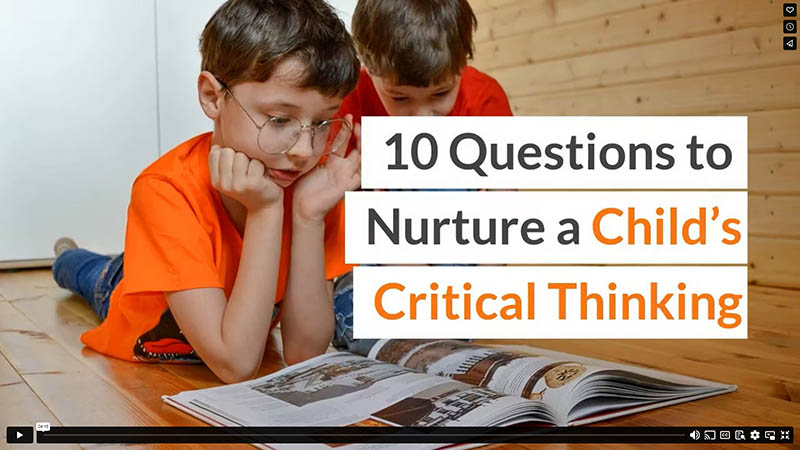Kids need critical thinking skills. Teachers and parents can help. Kids won’t develop this overnight, and a critical thinking lightbulb won’t flick on at a specific age. Instead, it is planted, watered, and nurtured through seeds of conversation from the time children begin processing spoken language.
At The Academy of Scholars Christian private school here in Atlanta, we firmly believe that it is never too early (or too late) to start growing those critical thinking skills. By working the following questions into your everyday conversations, parents and teachers can be more intentional about sharpening this crucial skill.
1. “What is the purpose of this?”
Asking this question to a child can help them evaluate the objective behind their actions and understand the value of purpose. Rather than learning to merely do as is expected of them, you can help children by explaining the reasoning behind what is expected or asked of them. Try asking this question in various ways, including, “Why do you want to do this?” or “What makes this important?”
Additionally, this train of thought can be a great way to help a child better understand and communicate their feelings by answering the question, “Why do you think you’re feeling this way?”
2. “What questions does this raise?”
Children must learn to ask questions when presented with new information or opinions rather than taking things at face value. This helps the child uncover gaps in their knowledge about the subject and consider what information is needed for a better understanding.
3. “Is there an alternative?”
When asked in the context of a situation where a problem must be solved, this question encourages children to think out-of-the-box rather than merely choosing what might be a quick and easy fix. Searching for alternatives builds resourcefulness and reminds children that a problem will often have more than one solution.
4. “What are the pros and cons of this option?”
Exploring this train of thought encourages children to weigh the benefits and disadvantages of different options to make a well-informed decision. Take it a step further by helping your child write down the pros and cons in list format. This will allow them to visually weigh each option and determine the best course of action.
5. “What do you think will happen if…”
This question helps a child observe, experiment, and create hypotheses. Use various forms of this question, such as, “What do you think will happen next?” when watching a movie or telling a story. This will help grow a child’s foresight and help them consider the potential outcomes of their choices.
6. “Why do you think that happened?”
A key element of critical thinking is the ability to consider cause and effect through observation. It helps children discover how and why a problem occurred and reach logical, fact-based conclusions. Helping a child determine why a problem occurred is the first step to deciding how the problem might be solved.
7. “Can you give me an example?”
Pointing out similarities in various situations helps a child notice patterns and connections. This helps them apply the lessons they’ve learned from one situation to another. It also helps them clarify and elaborate on what they are trying to communicate.
8. “How might someone disagree with your point of view, and why?”
Considering things from another person’s point of view is essential to cultivating empathy and awareness. Kids need to learn early on to accept that not everyone will share their opinions. This will help them build and maintain healthy relationships.
Teaching a child how to examine arguments for and against their opinion ensures that their conclusion will be well-informed and based on sound reasoning. In addition, you should teach children the art of civil discourse and disagreement.
Bonus question: “How could you respectfully share why you disagree?”
9. “What evidence brought you to this conclusion?”
With this question, you can encourage them to draw conclusions that can be backed up with sound, supportive evidence. This will build the confidence they need to articulate their points of view successfully.
10. “How could you research this more?”
Children should understand that there is no cap on knowledge. There will always be ways to add to and strengthen their understanding of a particular subject. To strengthen their critical thinking, they can dig deeper into reputable sources, compare and contrast timely and accurate data, and avoid making hasty assumptions.
When in doubt, begin by using the reporter’s tried and true method of uncovering information. Ask who, what, when, where, why, and how questions, rather than those that only allow for a yes or no answer. Take every opportunity to help a child to arrive at a conclusion on their own, rather than providing them with the answers or offering your own opinion. In doing this, parents and teachers can help grow the next generation of independent, critical thinkers.
Looking for an Atlanta elementary school that cultivates critical thinking from the youngest ages? Contact us today.
Infographic
Critical thinking is crucial for children. It helps them understand their actions, ask questions, think creatively, make logical conclusions, and express opinions. Parents and teachers foster critical thinking by incorporating questions into their conversations, creating a curious environment. This skill enables children to explore reliable sources, analyze data, and make informed decisions, equipping them for life’s challenges.

Video

